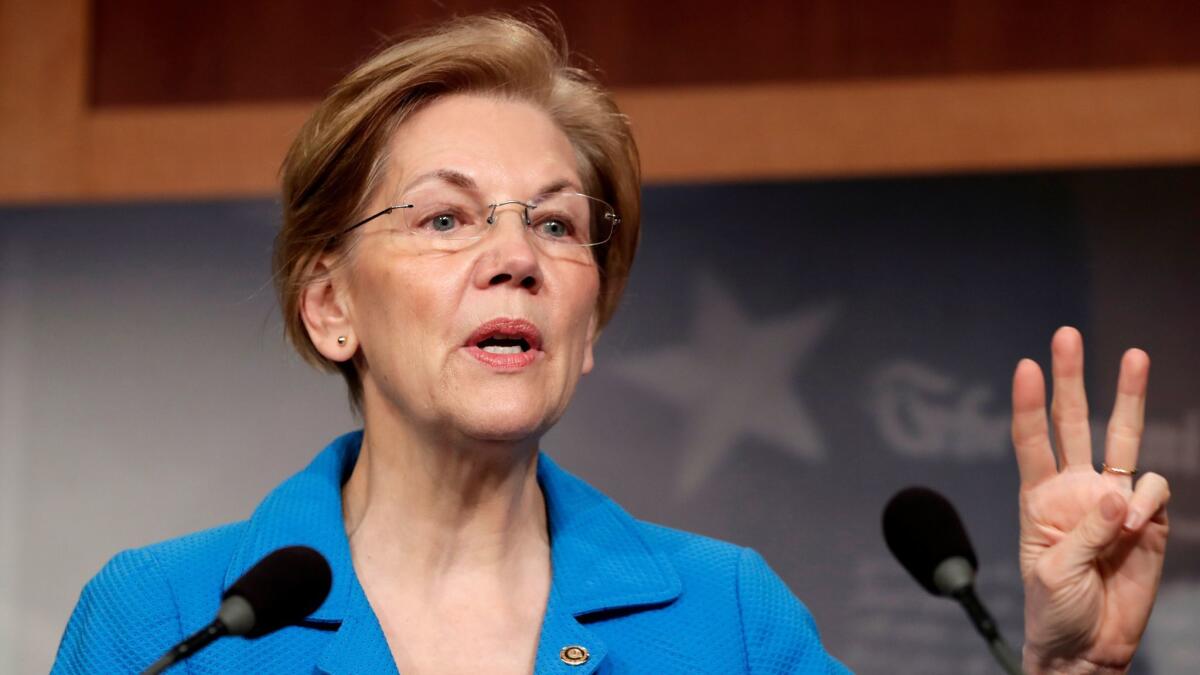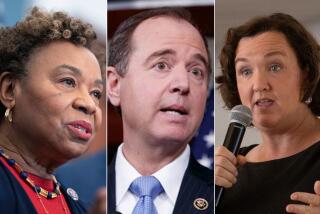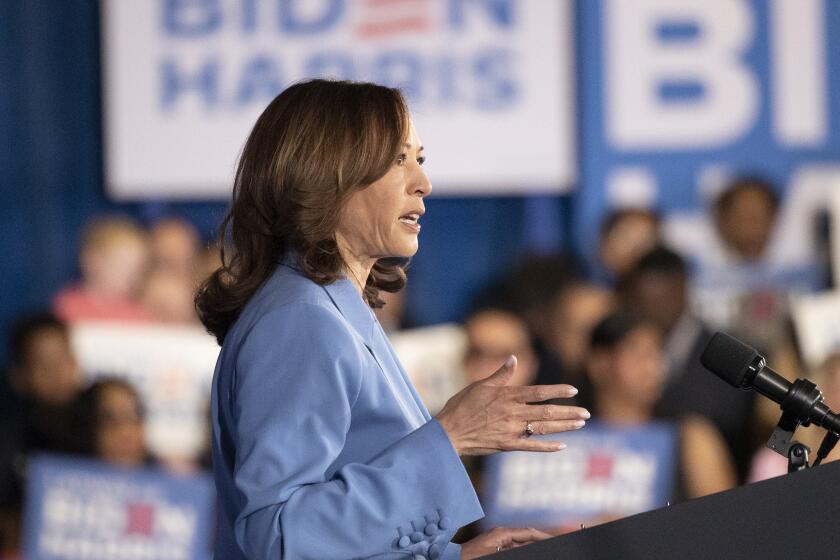Democrats fail to mend split over rolling back Dodd-Frank financial regulations

In the span of two hours on Capitol Hill Tuesday, the sharp split between liberal and moderate Senate Democrats on a major bank deregulation bill became crystal clear.
First, Sen. Elizabeth Warren (D-Mass.) stood before TV cameras to complain that the legislation, which is focused on helping small and midsized banks, would put “American consumers at greater risk” because it also loosens rules on larger financial institutions.
“Telling a bank that’s a quarter of a trillion dollars [in assets] that it can be regulated like some tiny, little community bank makes no sense at all,” she said, vowing to fight to amend the bill or halt its passage.
A short time later, four moderate Democrats sat down with reporters to explain their decision to co-sponsor what they described as sensible revisions to the 2010 Dodd-Frank Wall Street Reform and Consumer Protection Act.
“This a pretty carefully crafted bill … where Wall Street does not get the benefits, where it really is focused on small and midsized banks, and I think it’s the right direction to move at this moment in time,” said Sen. John Tester (D-Mont.).
Then they and their colleagues all hustled to the Senate floor to cast a key procedural vote on the legislation, which, if enacted, would be the most significant rollback of bank regulations since the 2008 financial crisis.
The bill advanced 67-32, likely clearing the way for the Senate to pass the bill this week or next, which would move it on to the House.
All Republicans supported the bill. They were joined by 16 Democrats and one independent, Angus King of Maine, who usually votes with the party.
The rest of the Democratic caucus, including California Sens. Dianne Feinstein and Kamala Harris, voted against moving the bill forward.
“I’m not for monkeying with Dodd-Frank,” Feinstein said after the vote, recalling how close the financial system came to collapse in 2008. “I think people who weren’t here maybe underestimate how close we came to a real meltdown.”
But nearly a decade after the crisis, some Democrats are ready to revise Dodd-Frank after years of complaints from bankers in their states.
Most of the new bill’s provisions are designed to ease burdens on small banks, including reducing regulations on new mortgages made by institutions that originate fewer than 500 such loans a year.
There’s almost unanimous support for those changes.
The problems come with other provisions of the bill that would reduce the number of financial institutions that automatically face more intense scrutiny in the wake of the 2008 crisis.
The legislation would raise the threshold for so-called systemically important financial institutions, which face mandatory and rigorous annual “stress tests” and other heightened oversight, to $250 billion in assets from the current $50-billion level.
That would provide significant relief for large firms such as State Street Corp., Charles Schwab Corp., Suntrust Banks Inc., and American Express Co. The Federal Reserve would retain the ability to apply heightened oversight to those firms, but it no longer would be mandated.
The Democratic split is over easing rules for larger banks.
Four Democrats on the Senate Banking Committee — including three up for reelection this year in states won by President Trump in 2016 — worked with Republicans to craft the bill. They said politics had nothing to do with the bipartisan effort, which began several years ago to try to provide relief for smaller banks, particularly in rural areas.
“This election has nothing to do with this,” Tester said. “This has everything to do with access to capital in rural America.”
Trump handily won Montana in the presidential election. He also won big in Indiana and North Dakota, the states of Sens. Joe Donnelly (D-Ind.) and Heidi Heitkamp (D-N.D.), who also helped draft the bill.
But another Democratic senator who worked on the legislation, Mark Warner of Virginia, noted he is not up for reelection and is proud of helping craft Dodd-Frank.
“I think our financial system is much stronger today because of Dodd-Frank and I would not participate in anything that I think is undermining that basic strength,” Warner said.
Landmark bills like Dodd-Frank require revisions as they’re implemented, Warner said. But that was stymied for a long time because of congressional dysfunction, as well as Republican insistence in the past on more sweeping changes, such as scaling back the authority of the new Consumer Financial Protection Bureau.
The legislation the Senate is considering this week, sponsored by Banking Committee Chairman Mike Crapo (R-Idaho), doesn’t touch the CFPB, Warner noted.
“CFPB is a bridge too far,” he said.
Crapo took over as committee chairman from Sen. Richard Shelby (R-Ala.) in 2017 and Democrats said he was more open to a deregulatory bill focused on small and midsized banks. His strategy helped draw in some moderate Democrats.
“This is a bipartisan bill, which means a lot of things that the Republicans would like to have put in are not there and a lot of things that the Democrats would like to have put in are not there,” Crapo said. The group drafting the bill was able to find consensus on provisions that help smaller banks, he said.
Some Senate Republicans, like Shelby, who want more deregulation, are going along with the bill because they said it’s about as good as they can get while still drawing enough Democratic support to overcome a potential filibuster from Warren and other liberals.
“I think it’s a step in the right direction. My bill was more ambitious,” said Shelby. He was unable to advance a broader deregulation bill that included increasing the threshold for systemically important financial institutions to $500 billion and making major changes to the consumer bureau.
House Republicans are expected to accept the Senate bill, and Trump is likely to sign it.
But many Senate Democrats said the bill goes too far in providing regulatory relief beyond the smaller banks.
“This body seems to have experienced sort of a collective amnesia,” Sen. Sherrod Brown (D-Ohio) said Tuesday. “Ten years ago, look what happened to the economy, and today we’re giving relief to many of the largest banks in this country.”
Opponents pointed to a Congressional Budget Office estimate that the bill would add $671 million to the federal budget deficit over the next decade, largely because the changes would slightly increase the small chance that a systemically important financial institution would fail or a financial crisis would take place.
But the CBO admitted its estimate “is subject to considerable uncertainty” because of the difficulty of predicting a major bank failure or crisis — a caveat that did little to mollify Warren.
“This bill will increase the likelihood that American taxpayers will be on the hook for another bailout,” she said. “I don’t understand how anyone, regardless of political party, could support a bill like that.”
But instead of just battling Republicans on bank deregulation, as she’s done often in the past, Warren now is fighting her fellow Democrats. That’s made her “enormously frustrated,” she said.
“All I know to do is to stand up and keep talking about this issue,” Warren said.
Twitter: @JimPuzzanghera
More to Read
Inside the business of entertainment
The Wide Shot brings you news, analysis and insights on everything from streaming wars to production — and what it all means for the future.
You may occasionally receive promotional content from the Los Angeles Times.










